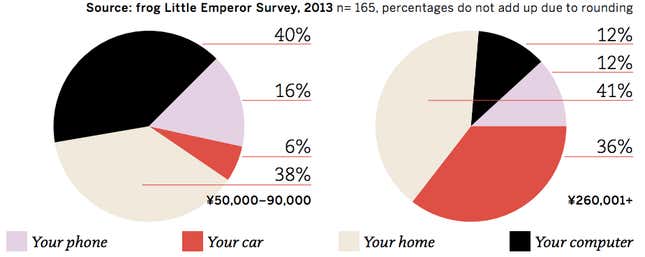The status symbol for today’s man would appear to be his cell phone. When answering the phrase, “The first thing people notice about me,” 61% of men surveyed in over a dozen countries by the mobile video and media company Vuclip said they believed people noticed what type of phone they owned. Others said their car, watch, or clothing.
Women also ranked the phone highest of any of the traditional status items but to a much lesser degree: 38% of women (but 82% of those under the age of 18) believed others noticed their phones first.
The cell phone has taken an interesting path, from its origins as a “rich man’s toy” in the 1990s to its near ubiquitous use in emerging and developed economies today. But if the phone is now so common, why do so many believe it’s what catches people’s eyes first?
Well, for one thing, upscale phones are increasingly becoming an attainable luxury for the new middle class in countries like China, where people often decorate their phones with trinkets, post photographs of them online, and debate intensely on blogs about different brands and models. China’s smartphone market is expected to hit 460 million by 2017.
Among wealthier Chinese, other status symbols take the place of cell phones. According to another survey released this month by the design company Frog, only 16% of Chinese earning between 50,000 and 90,000 yuan a year ($9,652-$14,478) named their phone as their most prized possession. Among the wealthier, those making above 260,000 yuan, the proportion was smaller, at 12%; for them, cars are a far bigger source of pride, perhaps because they’re much likelier to have one.





